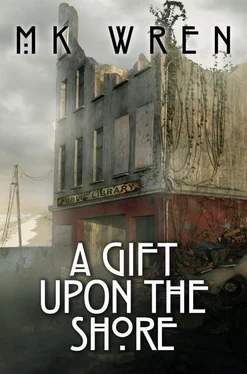And I close my eyes, let my breath out in a long sigh.
“It isn’t wrong, Stephen. Don’t ever let anyone make you think it is. Anyway, I was telling you about Rachel. She wasn’t doing much painting when I came to Amarna, but the house was still more a studio than a home. The big workroom in the center—that was a living room before she bought the house, but she made it into a studio for encaustic painting. Those are the ones done with wax and heat. And she made the dining room into a watercolor studio. Sometimes I still call it the north studio.”
Stephen is intrigued. Perhaps it hasn’t occurred to him that the house wasn’t always exactly as it is now and has been all his life. “What else was different?” he asks.
“Well, nothing, really. Before she bought the house, the living room was a sort of sun porch, I think, but when I came it was much the same as it is now, except we replaced some of the furniture.”
“Was the fireplace still there?”
“Oh, yes. Rachel heated the house entirely with wood. That was the cheapest source of heat for her since she had plenty of trees on her property. In fact, the old wood cookstove in the kitchen—well, it was an antique then, but she used it. I remember how amazed I was at that stove when I took my first look around the house. But the thing that amazed me most was the books. Nearly every wall had bookshelves, and more books were stacked on every table and even on the floor. I knew then I’d found a kindred soul.”
“How many books did she have?”
“I don’t know exactly. Thousands. What we have in the house now is only a few hundred. The duplicates.”
He looks up toward the Knob as if he could see the vault, but doesn’t seem to find it necessary to say anything about it. “Her neighbors—Jim and Connie—where did they live?”
“About half a mile south toward Shiloh. The ruins of the house are still there. They helped with Rachel’s garden and livestock and shared the harvest. Jim was a retired engineer, and his pension couldn’t even keep them in food. Rachel had a small income she’d inherited from her parents, but it was a pittance with the inflation that hit in the years before the End.” But I see that I’m not making sense to him. He doesn’t fully understand the concept of money. How could he understand inflation and a world economy skewed by a glut of population and by small, vicious wars that destroyed industries, cut off most of the world’s oil supplies, and disrupted trade networks?
“Did Rachel have a lot of livestock?” he asks.
That’s the economy Stephen understands, the elementary economy of food production. “Not as much as we have. Let’s see, she had chickens, rabbits, bees, goats, and one horse, a bay mare she called Silver. The mare was about as far as you could get from the original Silver.” His puzzled look tells me I must explain the Lone Ranger, and before I’ve finished that, Rachel’s choice of a name for the horse loses its humor. Finally, I add, “She also had the two shelties, Shadow and Topaz.”
“Didn’t you tell us one of her dogs was named Sparky?”
“Well, Sparky was Jim and Connie’s dog to begin with. The shelties—Jim told me they came from a kennel in Oldport that got burned out by a road gang. The two pups were the only survivors, and Rachel adopted them. Same story with Silver. She came from a stable in Shiloh. The owner rented horses to tourists, but he went broke and sold off the horses. For dog food, probably. By the time Rachel heard about it, Silver was the only one left. Rachel didn’t need a horse—couldn’t afford to keep it in hay—but she took Silver in. Just like she took me in.”
Stephen smiles gently at that, but his smile fades as he says, “You still grieve for her, don’t you?”
“Yes, I guess I do.”
He nods. “I still want to cry sometimes for Rebecca.”
We’re both silent for a while, sharing the pain dulled by three years, but still persistent. I loved Rebecca like the daughter I never had. So frail and fey, she argued nothing, accepted everything. Even death when it came in the trappings of agony. She left us little Rachel and the memory of music, of the clear honey of her singing.
Stephen’s hands close into fists. “I don’t understand why Rebecca had to die.”
Miriam called it the will of god.
“I don’t understand it, either, Stephen.”
“Maybe that’s something we’re not supposed to know.”
I hesitate, wait until he looks around at me. “Stephen, reasons are human inventions. I mean, reasons as opposed to explanations. You can invent a reason that will satisfy you, but you should be aware that it’s an invention.”
I let him think about that a moment, then I look out at the surf. “I’ve lost track of my story. Where was I? Somewhere in the middle of my recovery, I guess. I was bed-bound most of the time for about a week, and Rachel and Connie and Jim took care of me like I was a long-lost relative. I told them about the house Aunt Jan had willed to me, about my plans to live there and write. And they tried to warn me. Shiloh was a shadow of what it had been when I was there as a child. That’s why Connie took care of me at Rachel’s house instead of sending me to a hospital. There wasn’t a hospital closer than Portland. The USMA hospital in Shiloh had closed six years before. Connie ran a small clinic, and that was the only medical facility in the area. The town of Shiloh wasn’t even incorporated by then. Jim was the last mayor, by the way. He was also chief of the local Veepies.”
“What does that mean—Veepies?”
“Well, it was from the initials VP, for Voluntary Police. They were townspeople who helped the Federal Auxiliary Police, the Apies. Anyway, all Jim ever got out of ten years as chief of the Shiloh Veepies was a set of engraved handcuffs.” I have the handcuffs now; they’re among the memorabilia in my souvenir drawer. Stephen watches me, but remains silent, and at length I continue: “They tried to prepare me for what I’d find at my aunt’s house, but I didn’t listen. I didn’t want to listen. I’d quit my job in Portland, left the few friends I had there, left a man I loved, left my mother. Poor woman, she never got over Dad’s death, and then I left her. I asked her to come with me, but she wouldn’t. She was afraid. She didn’t know why, and that was the saddest part. But I couldn’t stay in the city. I had my dream—my dream of living by the sea and writing. And I had a house. All mine, free and clear. My house by the sea…”

A gray day, the clouds like fog waiting to settle on the land. It was the first time Mary Hope had been outside the house, except for occasional forays onto the deck. Yet she felt strong today, ready to get on with her new life. She knew she could deal with anything now. She had survived her trial by fire—with a little help from her friends.
Mary accepted the cane Rachel offered, declining the crutches Connie had provided. She didn’t need them now. Nor did she need any medication stronger than aspirin. On this day of all days, she didn’t want her head muddled. Rachel was quiet, almost taciturn. She didn’t argue with Mary about forgoing the crutches, nor comment when she had to help her into the old, red VW van.
Rachel backed the van out of the garage down a long driveway to a turnaround, then headed east, and Mary saw Amarna for the first time, saw the whole of it: the house weathered into its setting, the spruce trees on the bank ragged silhouettes, the bamboo south of the house lushly exotic. In her mind, bamboo was a tropical plant, but that giant grass flourished in this wet, temperate climate. She saw the high deer fence surrounding the garden; the orchard, veiled in the pink of furled buds; the barn, built by a carpenter, simple and functional, and like the house, covered with gray cedar shingles tinted green with microscopic moss. Silver was at the watering trough by the barn, flanked by three brown, lop-eared Nubian goats.
Читать дальше













